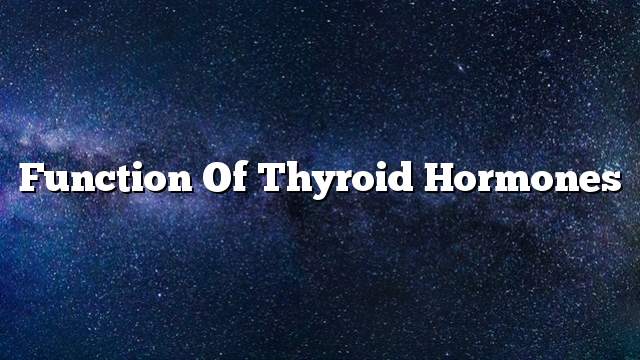These hormones affect many functions in the body and increase metabolism. These hormones increase body temperature by increasing oxygen uptake by the mitochondria found in various cells in the body, thereby increasing the manufacture of energy molecules known as triphosphate adenosine, The level of metabolism throughout the body increases and the heat increases
It also leads to increased liver breakdown of glycogen, increased absorption of glucose from the intestine and increased breakdown of insulin, which leads to an increase in the proportion of glucose in the water, which is used as a source of energy, and also break the fat in the body, and also increase the concentration of a number of hormones such as growth hormone Cortisone hormone and adrenaline hormone, but its effect on the heart increases the number of pulses and the strength of contractions because it increases the beta receptors on the muscle cells of the heart, so in the case of increased thyroid secretion should be given the patient anti-beta drugs to reduce heart palpitations and the impact of the Thyroid on the heart
Its effect on the bone increases the metabolism of the bone and disables it, leading to increased calcium in the blood and urine. It also increases the bowel movement leading to diarrhea in the case of increased thyroxine and constipation in case of deficiency. It also helps the fetus’s growth through the hormones of the gland The thyroid is secreted by the fetus from the week 16-18, not from the mother where the mother’s hormones do not cross into the fetus.
Conclusion
The thyroid gland is one of the endocrine glands located at the bottom of the head of the neck. Two hormones, thyroxine T4 and triiodothyron3, are released. The function of their hormones is to regulate and accelerate vital activities throughout the body. Its disease results from an increased secretion of these hormones called hyperthyroidism, Lack of secretion of these hormones and called deficiencies gland Thyroid
Symptoms of hyperthyroidism are many of the most important increase appetite and weight loss and diarrhea and increased heartbeat and menstrual cycle disorders in women. The symptoms of hypothyroidism are loss of appetite, weight gain, constipation, lethargy, etc. The diagnosis is based on the work of thyroid screening, T4 and T3 and thyroid stimulating hormone.
Treatment of hypothyroidism is based on giving the patient fibotheroxine. Treatment of hyperthyroidism is a surgical, radiological and pharmacological treatment.
